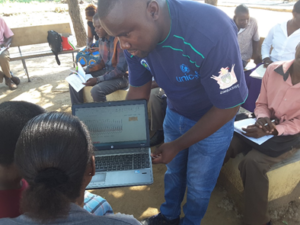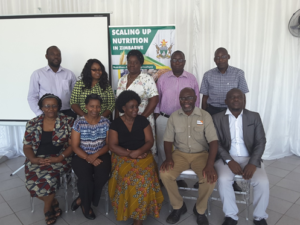Zimbabwe’s MSPs and their contribution to the food and nutrition security information system
Zimbabwe has established functional Multi-sectoral platforms (MSPs) from national to sub-national level, responsible for implementing a coordinated and holistic response to food and nutrition insecurity in the country. The Food and Nutrition Council (FNC), also the Scaling Up Nutrition (SUN) Convener, has the mandate to…

District Level MSPs participating in the collection of household and community data to inform policy and programming
Zimbabwe has established functional Multi-sectoral platforms (MSPs) from national to sub-national level, responsible for implementing a coordinated and holistic response to food and nutrition insecurity in the country. The Food and Nutrition Council (FNC), also the Scaling Up Nutrition (SUN) Convener, has the mandate to ensure the establishment, technical coordination and oversight for the MSPs at all levels.
One of the critical Core Functions of the MSPs is to participate in food and nutrition security assessments, surveillance and early warning activities. This information feeds into the national integrated Food and Nutrition Security Information System (FNSIS) which provides timely and reliable information to inform decision-making at policy level.
In March and April 2020, the sub-national MSPs undertook virtual monitoring in all 60 rural districts of the country. This data was used in the compilation of reports to update Government and Development Partners on the prevailing food and nutrition security situation in the country in light of the COVID-19 pandemic. The reports, namely the Food and Nutrition Security Monitoring Update, Lessons Learned in the COVID-19 Era and Prevailing Food and Nutrition Responses also documented the current response being implemented by key stakeholders, provided recommendations and captured the lessons learnt so as to inform future responses.
MSPs participate in key food and nutrition assessments which include Rapid Food and Nutrition Updates, annual Rural Livelihoods Assessments (RLAs) and National Nutrition Surveys. At district level, the MSPs are part of the pool of sub-national enumerators responsible for the collection of data from households and communities. Taking cognizance of the COVID-19 pandemic, the MSPs were capacitated to collect data for the 2020 RLA within their respective geographical areas to minimize the risk of transferring the virus outside their districts.
At provincial level, the MSPs undertake data analysis, report writing, response strategy development and dissemination of the assessment findings to inform programme implementation. At national level, through the ZimVAC which is a consortium of Government, Development Partners, UN, NGOs, Technical Agencies and the Academia which has the mandate to generate information on the Zimbabwean population’s livelihoods, the MSPs are responsible for report writing and building the capacity of the subnational structures in data analysis and reporting as well as ensuring that food and nutrition issues remain high on the national, regional and global development agenda. The SUN Networks are active participants in these MSPs at all levels and the SUN Focal Point is also the chair of the ZimVAC.
Since its formation in 2018, the Scaling Up Nutrition Research and Academia Platform (SUNRAP) continues to contribute towards the generation and dissemination of evidence on food and nutrition security. The SUNRAP is a member of the multi-sectoral ZimVAC and is actively involved in all aspects of the survey processes spanning from development of the survey framework, primary data analysis, secondary data analysis and advocacy to inform decision making.
Zimbabwe SUNRAP Steering Committee
MSPs also play a critical role in ensuring the utilization of information from food and nutrition assessments in the implementation of context specific response programmes. In response to findings from recent surveys, MSPs in Binga district in Matabeleland North province have initiated programmes to build the capacity of communities on the role of indigenous foods in household food and nutrition security, dietary diversity, child and women nutrition, household income, as a coping strategy. This has resulted in the continued interaction of the MSPs at various levels including community mobilization, coordination of structures at sub-national levels and use of scientific evidence to influence programming. The implementation of the multi-sectoral approach continues to be a key component in the functionality of these MSPs.
